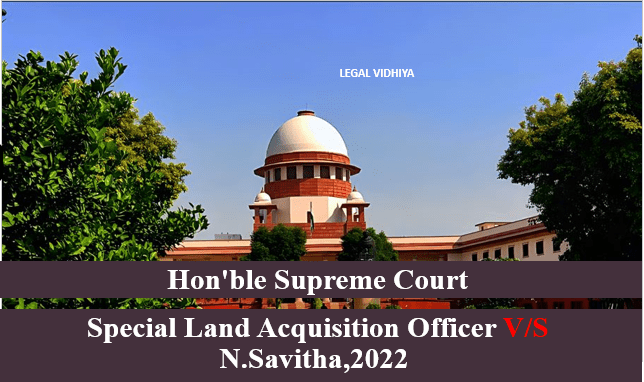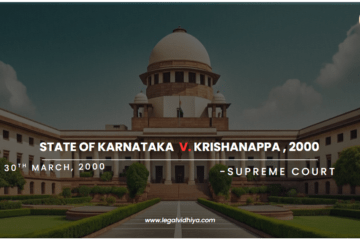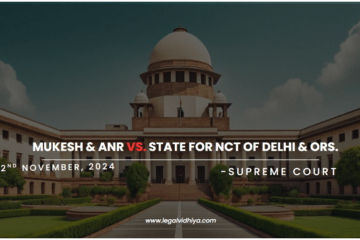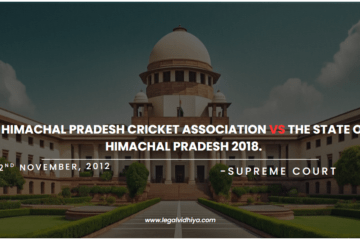
| CITATION – AIR 2022 SC 316 |
| DATE OF JUDGEMENT – MARCH 22,2022 |
| COURT – SUPREME COURT OF INDIA |
| APPELLANT – SPECIAL LAND ACQUISITION OFFICER AND ORS. |
| RESPONDENT – N. SAVITHA |
| BENCH – M.R.SHAH,B.V.NAGARATHNA,JJ. |
INTRODUCTION
The case “Special Land Acquisition Officer v/s N.Savitha” revolves around the relevant facts to be considered while awarding compensation in a land acquisition case. In the present case, the Karnataka High Court issued an order to enhance the compensation (paid in consideration of land acquisition) without carefully examining the complete records of the case and solely relying upon a consent award of another case and some “guesswork”. When the case came for consideration of the Supreme Court , the bench expressed its disappointment and accentuated the imprudent order passed by the High Court by mechanically relying upon the incomplete records of the case despite other crucial evidence(s).
FACTS IN BRIEF
In the instant case, the land belonging to one N.Savitha(respondent), measuring 0.20 guntas situated near Bechark Revenue Village,Belagola Hobli,Srirangapatna was acquired by the State (appellants) vide year 2009. The land was acquired for the expansion and improvement of the Ranganathittu Bird Sanctuary situated near respondent’s land.
Prior to the acquisition, a notification was issued under Section 4(1) of the Land Acquisition Act,1894 (hereinafter to be referred to as “the Act”). Subsequently, another notification was issued under Section 6(1) of the Act and compensation was paid vide date 08.10.2010 @Rs.21,488/- per gunta in correspondence to the prevailing circle rate and Rs.13,348/- for four coconut trees. Dissatisfied by the compensation amount, the landowner filed a petition under Section 18(1) of the Act before the reference court for reconsideration of the amount. Accordingly, the court accorded a sum of Rs,30,49,200/- per acre and Rs.33,600/- for the coconut trees.
Challenging the order, she preferred an appeal before the Karnataka High Court to increase the Compensation amount. Accordingly, the court passed a compensation award of Rs.40,000,00/- per acre along with other statutory benefits by excessively relying upon a consent award passed in the year 2011 and some “guesswork”. Hence, an appeal was filed by the appellant challenging the High Court’s decision before the Supreme Court.
ISSUE RAISED
1) Whether compensation passed in a consent award can be relied upon in another acquisition?
CONTENTIONS
1) It was contended that while granting compensation in the present case the High Court excessively relied upon the compensation passed in a consent award in the year 2011 at Rs.60 lakhs per acre.
2) Furthermore, emphasis was laid on the fact that the consent award was passed in respect of a land acquired in the year 2011 i.e. three years after the present acquisition and that too for the purpose of construction of a railway broad gauge between Bengaluru and Mysore. Per contra, in the instant case property was acquired for a different purpose,that is for the development of a Bird Sanctuary that does not have a higher development potential. Therefore ,the court ought not have relied upon the same for deciding the value of compensation in the present acquisition.
3) On the whole, the compensation amount was inappropriately passed as the Court did not aptly consider the available facts and evidence on record, instead
solely relied upon the consent award and some “guesswork”, not being in accordance with law.
JUDGEMENT
1) The Honourable Supreme Court partly allowed the state appeal and categorically held that consent award passed in a case cannot be the sole basis for determining compensation in another acquisition. While awarding compensation, it ought to be seen under what circumstances the award was passed.
2) The bench further observed that the High Court had mechanically relied upon the consent award which is evident from the fact that it omitted to consider whether the land acquisition in both the cases are similarly situated or not.
3) Accordingly, the High Court had erred in passing the compensation award @ Rs.40 lakhs per acre by solely relying upon the consent award of another land acquisition case of 2011, despite other evidence(s) on record.
4) Hence, the impugned order of the High Court was declared as unsustainable and the case was remanded to be decided afresh in compliance with law and merits of the case.
ANALYSIS
1) According to the settled position of law, it is clear that the ascertainment of compensation in a land acquisition case depends upon the prevailing market value of land and various other notable factors such as the location where the property is situated, the purpose for which it is being acquired.
2) For instance, a land situated in the vicinity of a metropolitan city may have a higher market value than a land located in the interior part of a village which may not have higher potential for development.
3) In the light of instant case, a land acquired in 2011 for the formation of railway broad gauge may have a higher compensation demand than a land acquired in 2009 for mere expansion of a Bird Sanctuary that does not have a higher development potential.
4) Therefore, the compensation awarded in any other case cannot be relied upon for deciding the compensation of the current acquisition case,unless there is a rational nexus between the two cases.
CONCLUSION
The instant case, “ Special Land Acquisition Officer v/s N.Savitha” sets a significant legal precedent for determining compensation in a land acquisition case, in the sense that the court while awarding compensation cannot solely rely upon the compensation of another acquisition without carefully examining other available facts and evidence on record in accordance with law and merit.
REFERENCES
1) https://indiankanoon.org/doc/109891416/
2) https://main.sci.gov.in/pdfdate/index1.php?filename=supremecourt/2022/3773/37 73_2022_12_1505_34279_Judgement_22-Mar-2022.pdf&dno=37732022&dt=20 22-03-22
This article is written by Nandini Sharma, student of Shambhunath Institute of Law, intern at Legal Vidhiya.
Disclaimer: The materials provided herein are intended solely for informational purposes. Accessing or using the site or the materials does not establish an attorney-client relationship. The information presented on this site is not to be construed as legal or professional advice, and it should not be relied upon for such purposes or used as a substitute for advice from a licensed attorney in your state. Additionally, the viewpoint presented by the author is of a personal nature.




0 Comments